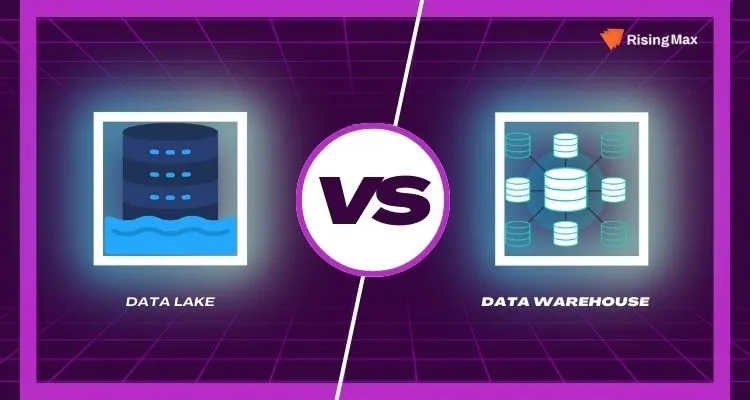Organizations are continuously looking for efficient and effective ways to store, handle, and analyze enormous amounts of data in today’s data-driven world. The two popular storage options essential in this environment are data lakes and data warehouses. Making wise decisions about data management and analytics tactics requires understanding the distinctions between these two storage architectures.

Data scientists, engineers, and business analysts use data lakes and warehouses as big data storage platforms. These fundamental distinctions are crucial for any prospective data worker to understand because they are more unlike than like.
Understanding Data Lake And Data Warehouse
Data lakes offer more flexibility in data storage and analysis because they don’t require a preset structure, in contrast to data warehouses. Because of this, data lakes are the perfect tool for gathering and preserving various data kinds without requiring significant data transformation up front.
On the other hand, data warehouses are designed to handle structured data that has been prepared, cleaned, and arranged for certain use cases. They usually employ a schema-on-write methodology, which arranges and structures data at the time of ingestion. Because of this, structured data is stored more efficiently, and queries run more quickly, which makes data warehouses ideal for use in reporting, business intelligence, and decision-making processes.
Understanding the difference between data lake and data warehouse is essential for efficient data management and decision-making. This blog examines the key differences between data lakes and data warehouses, explaining their distinct features, designs, and ideal applications.
Regardless of the background – enterprise, professional, or hobby – the insights offered here give you the know-how to confidently decide on your data strategy. Now, let’s explore the difference between data lake and data warehouse so you can leverage your data projects for unmatched success.
Ready to start your data science journey?
RisingMax is a leading software development company that specializes in Metaverse, Data Science, AR/VR, Web3, blockchain, and NFT game development.
Data Lake Vs Data Warehouse: Paramount Distinctions
Data lakes and warehouses differ primarily in architecture, data kinds, processing techniques, and use cases. Because data lakes are made to hold unprocessed, raw data in its original format, they can handle a wide range of data types with flexibility and scalability.
On the other hand, data warehouses are designed to handle structured, cleaned, and organized data, making them perfect for carrying out sophisticated analysis and queries for reporting and business intelligence needs.
The way that data processing is approached is another important distinction. Schema-on-read data lakes retain data without modification; the schema is applied when the data is analyzed. As a result, data lakes can facilitate exploratory research and adapt to changing data needs.
On the other hand, the schema-on-write methodology used by data warehouses structures and organizes data at the moment of ingestion, improving query performance and streamlining data processing for certain use cases.
Additionally, data warehouses are designed for high-performance structured data querying and analysis, whereas data lakes are more affordable for storing substantial amounts of raw, unstructured data.
Organizations aiming to utilize the advantages of both storage options to fulfil their various data management and analytics requirements must comprehend these important distinctions.
| Data Lake | Data Warehouse | |
| Data Structure | Raw | Processed |
| Purpose Of Data | Not Yet Determined | Currently in use |
| Users | Data Scientists | Business Professionals |
| Accessibility | Highly accessible and quick to update | More complicated and costly to make changes |
| History | Relatively new for big data | The concept is from decades |
Benefits Of Data Lakes And Data Warehouses
Anyone can improve the accessibility, dependability, and security of their data using any one of these storage options. Here are some examples of applications for them:
- Keep your company’s data safe for analysis.
- Keep infinite data for as long as you require it.
- Dismantle silos by integrating data from several corporate operations.
- Examine past information or legacy databases.
- Conduct batch and real-time data analysis.
Both options are economical because users just pay for the storage space they need. They have the ability to retain all of their data, examine it for trends and patterns, and utilize the results to streamline the company’s operations.
Benefits Of Data Lake For Data Scientists
Organizations handling unstructured data find data lakes appealing storage solutions due to their numerous benefits. The capacity of data lakes to retain unprocessed data in its original state without requiring further data transformation is one of its main advantages.
Furthermore, data lakes give businesses the ability to put in place a scalable and adaptable storage solution for changing data needs. Scalability like this is especially helpful for enterprises handling massive amounts of data from several sources, such as social media, IoT devices, and sensor data.
Large volumes of data can be cost-effectively stored in data lakes without having to adhere to strict schema requirements up front, which promotes flexibility in data administration and analysis.
Additionally, data lakes facilitate data discovery and exploratory analysis, enabling analysts and data scientists to extract knowledge from unstructured data without being limited by preset schemas. This feature encourages creativity and well-informed decision-making by enabling enterprises to find insightful patterns and insights in their data. For organizations looking to maximize these benefits and navigate the complexities of data lake implementation and optimization, engaging Data Lake consulting services can be highly advantageous.
Benefits Of Data Warehouse For Business Professionals
Organizations need data warehouses to meet their reporting and analytical needs since they are specifically designed for structured data and provide a number of benefits. The optimized schema-on-write method of data warehousing guarantees that data is cleaned, arranged, and structured at the moment of ingestion, which is one of its main benefits.
This makes data warehouses perfect for corporate intelligence and reporting needs since it leads to quicker query performance and effective data processing for structured data.
Moreover, data warehouses are made to facilitate sophisticated analytics and querying, allowing businesses to extract useful information from their structured data. This capacity is necessary to support forecasting, performance analysis, and well-informed decision-making inside a company.
Furthermore, data warehouses come with integrated data governance and security capabilities that guarantee the safety and compliance of sensitive company data with legal standards. This component is essential for businesses operating in highly regulated sectors where data security and compliance are critical.
Because of its many benefits, data warehouses are an essential aspect of every company’s data architecture, especially when it comes to enabling vital business operations and gleaning insightful information from structured data.
Applications Of Data Lake Vs Data Warehouse
Data Lake Use Cases
Utilizing their capacity to store and process enormous volumes of unstructured, raw data, data lakes support a wide range of use cases in numerous sectors. Within the field of data science and advanced analytics, data lakes offer an ideal environment for investigating data, testing theories, and creating models.
Data scientists may spur innovation and predictive analytics projects by using data lakes’ flexibility to find hidden patterns and insights in unprocessed data. Furthermore, data lakes make streaming data processing and real-time analytics from social media platforms, Internet of Things devices, and other sources possible.
Companies can use data lakes to record and examine flowing data in its unprocessed state, giving them the ability to get insights in real-time and react quickly to shifting consumer and market conditions. This real-time analytics capabilities is especially beneficial in sectors where prompt insights can create competitive advantages, including finance, retail, and healthcare.
Furthermore, massive amounts of unstructured data, including text, photos, and multimedia information, are well-suited for analysis and storage in data lakes. Because of this, they are the perfect fit for applications like recommendation systems, sentiment analysis, and content management, where it is crucial to process and extract meaning from various data kinds.
The data lakes’ use cases highlight their adaptability and significance in meeting contemporary enterprises’ changing data management and analytics requirements.
Data Warehouse Use Cases
Data warehouses are essential for various use cases that need organized data for reporting, business intelligence, and decision-making. Organizations that rely on structured data to produce accurate financial statements, predictions, and business performance measures frequently employ data warehouses for financial analysis and performance reporting.
Data warehouses offer a strong foundation for carrying out intricate searches and analyses to produce useful information for financial decision-making. Structured data is utilized to obtain insights into customer behaviour, preferences, and purchase patterns in marketing analytics and customer segmentation campaigns, which are largely made possible by data warehouses.
Organizations can improve their marketing strategies, customize client experiences, and launch focused marketing campaigns by utilizing data warehouses’ analytical capabilities. These initiatives are supported by thorough data analysis.
Additionally, data warehouses are widely used in operational reporting and performance monitoring, allowing businesses to monitor operational metrics, business process efficiency, and key performance indicators (KPIs). This use case demonstrates how crucial structured data is to an organization’s ability to make strategic decisions, optimize processes, and enable operational insight.
The wide range of applications for data warehouses highlights how important they are for promoting operational excellence and data-driven decision-making in a number of different business sectors.
Data Lake Vs Warehouse: How To Choose Between Them
The particular data management and analytics requirements of a company will determine which of a data lake and data warehouse is best. Organizations should take into account the kinds of data they must store and analyze, the scalability and agility needed for data processing, and the kinds of analytical use cases they hope to enable when making this choice.
Data lakes are the best place to store unstructured, raw data and enable real-time analytics, exploratory analysis, and a variety of data kinds. They are affordable for storing vast amounts of various data kinds and provide flexibility and scalability to meet changing data needs.
However, data warehouses are ideal for complicated analytics, optimal query performance, and organized data storage for reporting, corporate intelligence, and decision-making. They perform exceptionally well in areas where structured data is necessary to produce meaningful insights and support vital business operations, such as operational reporting, financial analysis, marketing analytics, and performance monitoring.
Organizations must evaluate their data types, processing needs, analytical use cases, and long-term scalability when choosing between a data warehouse and a data lake in order to choose the best storage option for their unique requirements.
Notably, numerous firms choose to adopt a hybrid strategy, utilizing data lakes and data warehouses in tandem to optimize the advantages of each storage solution. With the help of this hybrid approach, companies may support a broad range of analytical use cases, connect and analyze varied data types, and strike a balance between flexibility and structured data processing.
Organizations may create a comprehensive data management and analytics infrastructure that enables data-driven decision-making throughout the company and adapts to changing business needs by integrating the capabilities of data lakes and data warehouses.
Concluding All The Information,
To sum up, enterprises looking to maximize their data management and analytics strategies must understand the differences between data lakes and data warehouses. It is essential to comprehend the distinct features, benefits, applications, and difficulties associated with data lakes and data warehouses in order to make well-informed data management choices.
While both storage options have unique advantages and capacities to meet a range of data management and analytics needs, businesses must carefully assess their unique needs in order to choose the best course of action.
Organizations can customize their data infrastructure to meet their specific needs, from using the optimized query performance and structured data processing of data warehouses for business intelligence and reporting to utilizing the flexibility and scalability of data lakes for raw, unstructured data analysis.
Organizations can create a holistic data management and analytics ecosystem that fosters innovation, well-informed decision-making, and operational excellence in the big data era by leveraging the strengths of both data lakes and data warehouses.
The strategic integration of data lakes and data warehouses will continue to be a fundamental component of successful data management and analytics strategies as the data environment changes, enabling businesses to utilize their data for unmatched success.















